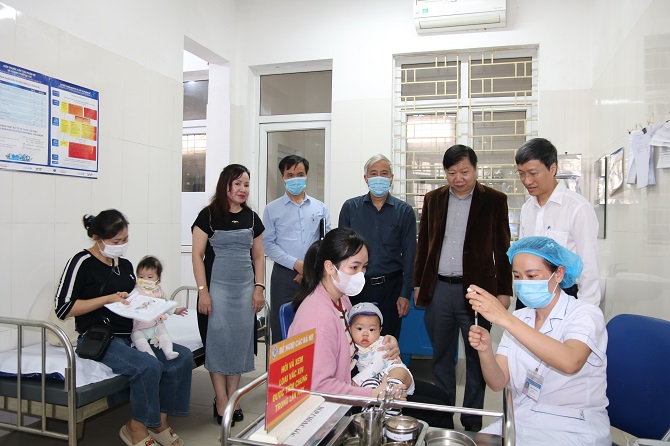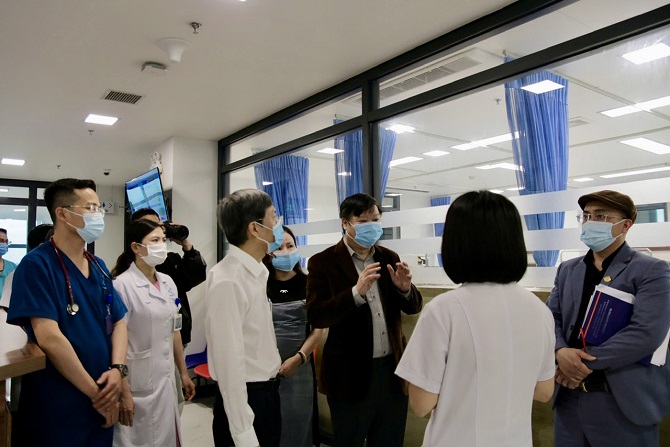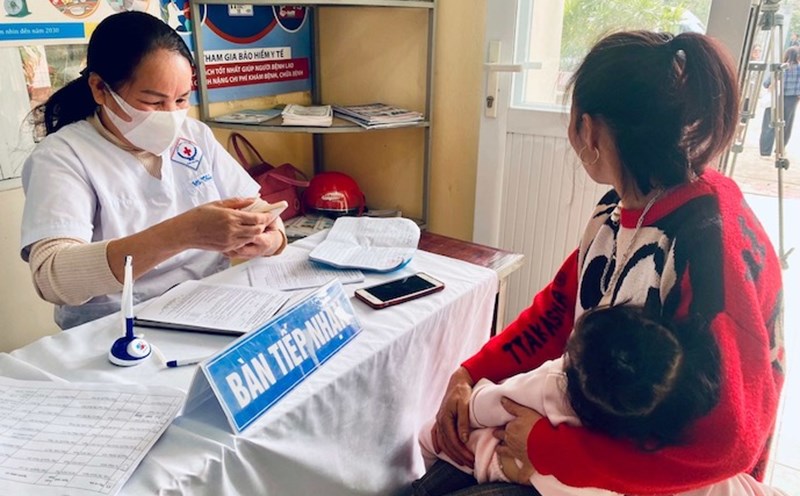Preventing cross-infection in hospitals
According to the reporter's records at Hanoi Children's Hospital, in the context of the increasing measles epidemic, cross-infection control and prevention in the hospital has been strengthened.
The flow and early and accurate diagnosis of measles cases from hospitalization to isolation rooms and treatment areas are conducted synchronously and methodically.
"My child showed signs of fever and rash, I took him to the hospital for examination immediately and was diagnosed with measles. When I entered the hospital, I saw that most of the staff, medical staff, patients and their families were wearing full masks, and had regular hand sanitization... I myself had to be aware of preventing infection in the hospital for others" - Ms. N.D.N (26 years old - Ha Dong, Hanoi) shared.
Dr. Do Thi Thuy Nga, Deputy Director of Hanoi Children's Hospital, said that as of March 26, Hanoi Children's Hospital has treated 277 patients with measles as inpatients, of which 233 cases have recovered, and 44 cases are being treated as inpatients at the hospital.

Sharing about the measles epidemic situation in Hanoi, Mr. Vu Cao Cuong, Deputy Director of the Hanoi Department of Health, said: According to statistics from the Department of Health, since the beginning of the year, the whole city has recorded 1,320 cases positive for the measles virus.
Patients recorded in 30/30 districts, towns and cities. The results of the analysis of some epidemiological characteristics of measles cases show that most patients with the disease are children under 5 years old (accounting for 64%) and have not been vaccinated or have not received enough 2 doses of measles vaccine (accounting for 83%).
Measles prevention and control activities have been proactively and drastically implemented by the Hanoi health sector in accordance with the direction of the Government, the Ministry of Health and the city. At the same time, based on the actual developments of the epidemic situation, ensure good disease control in the area.

4 key measures to effectively prevent and control measles
Prof. Dr. Phan Trong Lan, Director of the Central Institute of Hygiene and Epidemiology (Ministry of Health) said that measles is currently on the rise in many areas of the world as well as in Vietnam, including Hanoi.
exchanges and travel between regions and localities are a risk of spreading measles. Therefore, to prevent the measles epidemic, the Hanoi health sector needs to focus on implementing 4 key measures.
First, improve community immunity through fully and accurately vaccinating against measles, managing vaccinated subjects well, especially in mountainous areas with diverse populations and hard of reaching, proactively detecting area craters, conducting appropriate dredging and additional vaccination.
Second, monitor and detect early to isolate and manage cases promptly.
Third, fight infection in the community through vaccination, disease prevention instructions, and self-monitoring of health.
Fourth, fight infection in hospitals, fight infection in hospitals needs to be implemented immediately with the control of measles cases admitted to hospitals through district treatment, early and accurate diagnosis, limiting family members/caregivers from contacting the cases, quarantine and treatment.

The Ministry of Health believes that measles in Vietnam in the coming time is at risk of continuing to increase, and it is still necessary to be very careful with the risk of outbreak. It is expected that the number of suspected measles rash fever cases will continue to be recorded nationwide.
In the face of the complicated and unpredictable developments of infectious diseases, especially measles, the Ministry of Health recommends that People's Committees of provinces and cities prioritize ensuring resources to speed up the progress of the measles vaccination campaign, especially for children who are not old enough to be vaccinated or have not received enough doses of vaccine, must be completed in March.
Measles is one of the leading causes of death in children due to complications of pneumonia, encephalitis, severe diarrhea and malnutrition. The disease does not have a specific treatment, vaccination is an effective measure to prevent the disease.











